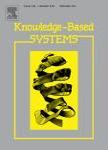版权所有:内蒙古大学图书馆 技术提供:维普资讯• 智图
内蒙古自治区呼和浩特市赛罕区大学西街235号 邮编: 010021

作者机构:Sun Yat Sen Univ Shenzhen Campus Shenzhen Guangdong Peoples R China Univ Alberta Edmonton AB Canada Tencent Platform & Content Grp Shenzhen Guangdong Peoples R China
出 版 物:《KNOWLEDGE-BASED SYSTEMS》 (Knowl Based Syst)
年 卷 期:2025年第310卷
核心收录:
学科分类:08[工学] 0812[工学-计算机科学与技术(可授工学、理学学位)]
基 金:Shenzhen Science and Technology Program China [202206193000001 20220817180954005]
主 题:Unbiased sequential recommendation Rating prediction Graph representation learning
摘 要:Inevitable biases in the observed data often result in biased user representations and recommendation outcomes. Currently, most debiasing techniques are designed for traditional recommendation systems and typically rely on an unbiased dataset to estimate Propensity Scores (PS), which are crucial for developing robust recommendation models. However, in sequential recommendation scenarios, obtaining such an unbiased auxiliary dataset is extremely challenging, which significantly complicates the accurate estimation of inverse propensity scores and the extraction of unbiased user representations from biased user-item interactions. To address this challenge, we propose a Disentangled Graph Transformer (DGT) model enhanced by Propensity Scores for unbiased sequential recommendations. Specifically, we construct a temporal heterogeneous network and extract disentangled representations of users and items, effectively reducing the impact of self-selection bias in historical interaction data. Additionally, we decompose the propensity score into three distinct components: user-rating propensity, item-rating propensity, and user-item correlation propensity. By incorporating the distributions of user and item ratings as prior knowledge, we improve the precision of our propensity score estimation. Ultimately, these refined propensity scores are strategically employed as weighting factors within the loss functions and during the aggregation phase of the DGT layer, thereby strengthening the sequential recommendation system s resistance to biases. We have conducted extensive experiments on five benchmark datasets to assess the efficacy and robustness of our model. In comparison with the state-of-the-art approaches, our DGT model has exhibited superior ability to provide unbiased recommendations. Our codes and datasets are available at GitHub: https://***/ycy89/***.